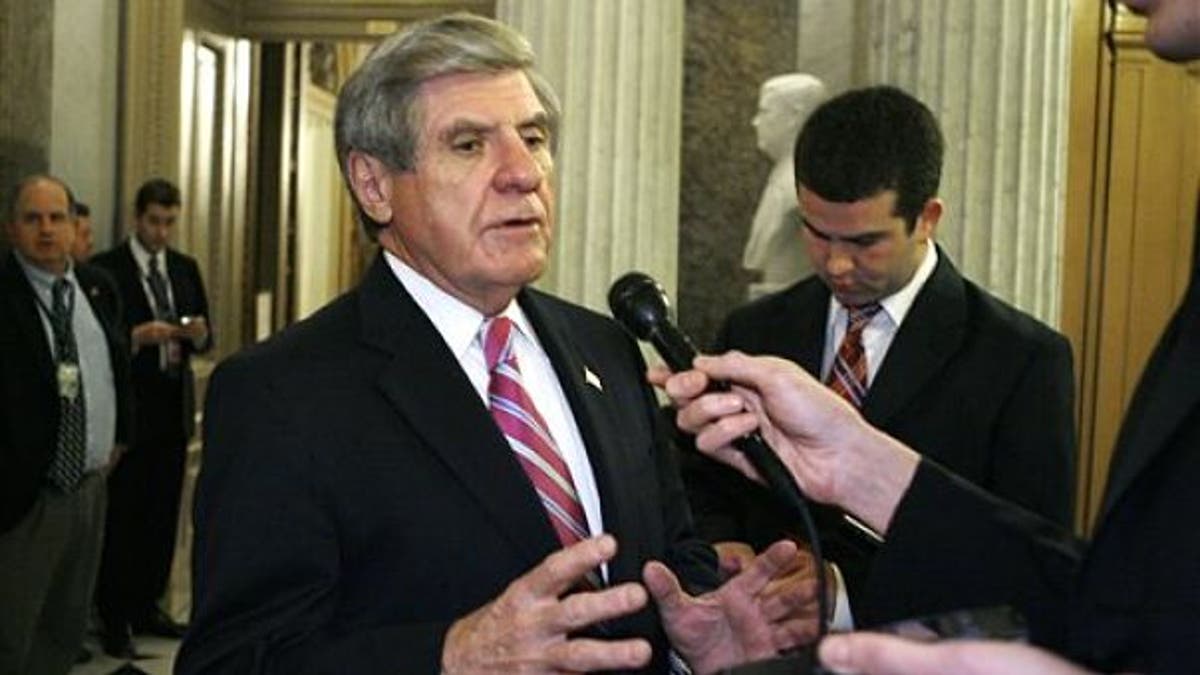
Saturday: Sen. Ben Nelson of Nebraska is a Democratic moderate who voted to begin debate on health care legislation. (AP Photo)
Calling the Senate health care bill a package that Ponzi schemer "Bernie Madoff would really envy," Republican Sen. Jon Kyl said Sunday that the legislation to be debated in December is long on promises but short on accounting.
"When they claim a savings ... in the first 10 years, that's because they start collecting taxes in 2010 they don't start spending money till 2014," said Kyl, helping to kick off the debate senators voted a day earlier to start on the $848 billion package
"Any private or any publicly traded business that claimed it was making a profit because it booked revenue over 10 years but only booked expenses over six years would wind up in jail. That's what this bill does, that's just many of the frauds and hat tricks in this bill," Kyl said on "Fox News Sunday."
The 60-39 vote opened the door for to start after Thanksgiving. The measure is designed to extend coverage over six years to an estimated 31 million Americans who lack it and crack down on insurance industry practices that deny benefits for pre-existing conditions or when people lose their jobs.
The vote follows House passage two weeks ago of a version of health insurance reforms that passed 220-215, also on a Saturday night.
The bills have many similarities, including the new requirements on insurers and the creation of new purchasing marketplaces called exchanges where self-employed individuals and small businesses could go to shop for and compare coverage plans. One option in the exchanges would be a new government-offered plan, something that's opposed by private insurers and business groups.
Differences include requirements for employers. The House bill would require medium and large businesses to cover their employees, while the Senate bill would not require them to offer coverage but would make them pay a fee if the government ends up subsidizing employees' coverage.
Another difference is in how they're paid for. The Senate bill includes a tax on high-value insurance policies that's not part of the House bill, while the House would levy a new income tax on upper-income Americans that's not in the Senate measure. The Senate measure also raises the Medicare payroll tax on income above $200,000 annually for individuals and $250,000 for couples. Both bills rely on more than $400 billion in cuts to Medicare.
Sen. Ben Nelson, D-Neb., was one of 58 senators and two independents who voted to allow debate. He told ABC's "This Week" that he changed his mind about permitting debate because "when I saw the bill, I said, 'This can be amended. It can be improved.' And the -- the debate should begin."
Nelson said his biggest concern is "cost containment" but the bill also does address "the effort on prevention, early detection, wellness, the workforce development for more primary care physicians."
"Those will all be helpful in -- in reducing the costs of health care," he said.
But Sen. Lamar Alexander, R-Tenn., said the bill costs too much for Americans. "It has higher premiums, higher taxes, Medicare cuts, puts 15 million more low-income Americans into a medical ghetto called Medicaid."
Alexander said Republicans prefers something simpler than the 2,074-page Democratic bill.
"If you expect Mitch McConnell to roll in a wheelbarrow with a Republican 2,000-page bill, it's not going to happen," Alexander told "Fox News Sunday."
"But we do have proposals to let small businesses to pool their resources, to reduce junk lawsuits, to let people buy insurance across state lines. And I think most people would be much more comfortable with us biting off what we could chew instead of this arrogance of thinking we can fix the whole system all at once."
Coburn said he sees three problems with the current bill.
"One, 61 percent of health care in this country is already run by the government. Name one that works well," he said, calling Medicare "highly inefficient" and going broke.
"Number two is, this -- this bill creates 70 new government agencies with thousands of new bureaucrats ... with 1,597 different instances where the secretary's mandated to write rules and regulations. ... The third point that I would say is we can fix all these problems, but we have a government-centered approach that is already failing instead of a patient-centered approach. ...There's 11 studies out as of this morning that said both the House bill and the Senate bill will raise premiums, not lower them," he continued.
Sen. Debbie Stabenow, D-Mich., said concerns are also unfounded about the role of the U.S. Preventive Services Task Force, which last week recommended the age for mammographies change from annual exams at age 40 to exams every other year for women 50 and over.
Stabenow added that the Senate bill does not go as far as the House bill in limiting abortion access for women, but it does keep in place "30 years of settled law that says that federal funds should not be used to pay for abortions."
"The real issue ... is whether or not a woman with her own money should be able to purchase insurance that covers her complete health care needs, and so that's the question -- with your own money," she said, adding, "Almost 60 percent of the plans today don't offer basic maternity care, we don't see mammograms covered -- and so for -- women actually have more to gain with health care reform than men do because we pay about 50 percent more in premiums for the very same policies."












































